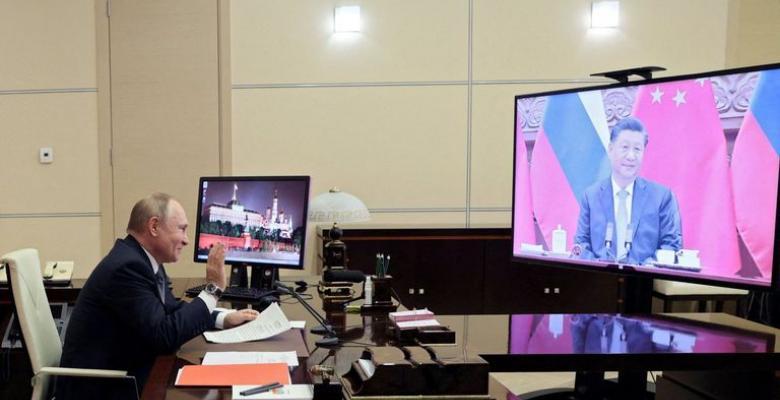Russia-China Coordination: Stabilizing Role
especiales

Over the continued U.S. stance of fueling, even more, the geopolitical turmoil, breaking agreements on arms control and escalating conflicts across the world, Russia and China found common ground in still maintaining a coordination to play a stabilizing role in global issues on the most serious issues of the international agenda.
Not for nothing presidents Vladimir Putin and Xi Jinping recently agreed upon the continuation of the Treaty on Good-Neighborliness between the two countries, which was signed twenty years ago, as both nations do not have territorial claims and are determined to turn their common border in a peace and friendship zone.
After large-scale joint operations in Russian territory, both sides highlighted that they will further strengthen cooperation on international affairs and “carry out more joint operations to more efficiently safeguard security and mutual interests.” “We firmly support each other on issues related to each other's fundamental interests, and in protecting the dignity of each country," said Xi, who also praised his Russian counterpart for stopping attempts by "international forces to create divisions” between Russia and China.
Putin, who described relations between Moscow and Beijing as a "true model of interstate cooperation for the 21st century," stressed that "the close coordination between the two of us has formed a new model of cooperation between our countries, based on foundations such as non-interference in internal affairs and respect for the interests of others.”
All of this is corroborated by the growing trade cooperation that this year exceeded a record $100 billion USD, despite global financial crises and the COVID-19 pandemic.
But perhaps, and most importantly, this close interaction brings positive energy to the international community, creating an example to follow in the formation of a new kind of international relations.
This olive branch that is presented to the world is accompanied by an increasingly developed and advanced military training, without damaging the budget for peremptory and necessary issues for the peoples of both nations, and upholds the principles of respect for human rights.
It has been, and actually is, an honorable response to the West's claims to undermine the defensive wall that Russia has had to build with its armed forces to stop the constant advance of the aggressive troops of the North Atlantic Treaty Organization (NATO) towards its border, under the guise of "defending Ukraine", when it is Ukraine the one trying to attack the anti-fascist bastion erected in Donbass.
Likewise, the United States is building military bases closer to China. The U.S. Indian and Pacific fleets are moving ever closer to the jurisdictional waters of the People's Republic, involving the Chinese island of Taiwan and its Australian and Japanese partners in their aggressive stance.
ANTI-COVID FRONT
Long before the U.S. falsely aimed to portray itself as the heroes in the face of the novel coronavirus pandemic, Russia and China closely cooperated to help the neediest peoples, according to their abilities.
Thus, Russia and China have already produced 100-plus million doses of Sputnik V, through an agreement with the pharmaceutical company Hualan Biological Bacterin that helps increase the production capacities of the Russian vaccine.
The director of the Russian Direct Investment Fund, Kirill Dmitriev recalled that China is one of the key partners for the production of Sputnik V.
The effectiveness of the Russian vaccine is 91.6% and the collaboration with Hualan Biological Bacterin allows Russia to significantly increase the production capacities of the vaccine, which is also manufactured in Serbia and India, among other countries.
MEANWHILE…
Russia and China closely cooperate in the health sector. Moscow pointed out that Russia has the means to respond to threats from the West, with its years of progress against the U.S. in the production and effectiveness of hypersonic weapons.
At two separate events —the Eastern Economic Forum, in Vladivostok, and the Vostok military games— Russia and China proved to the West that they are working together to counter America's unilateralism.
The U.S.-China tariff war and the continuing sanctions on Russia bring relations between Beijing and Moscow closer. Likewise, the protectionist course initiated by Trump and followed by Biden, make China and Russia examples of bilateral cooperation and globalization.
In this context, China noted that relations with Russia are at their best, ushering in a new era of even better prospects for diplomacy with Moscow.
Russia and China are also reflecting on ways to cooperate more closely in Central Asia, and working together to advance their own projects: China’s "Belt and Road Initiative" and Russia’s "Eurasian Economic Union".
While the United States, the United Kingdom, Australia and Canada have announced a diplomatic boycott to the Winter Olympics, which Beijing will host next February, Vladimir Putin reiterated his promise to travel to the inauguration for a new meeting with the leader that he described as his 'dear friend' -, Xi addressed Putin as an 'old friend'.
It will be the 38th time since 2013 —when the Chinese president came to power— in which both leaders meet, in a bilateral relationship that has been intensifying as their respective countries' relationship with the White House deteriorates. Both nations seek to serving as a counterweight to the warmongering policy of the Western powers.
Translated by Sergio A. Paneque Díaz / CubaSí Translation Staff













Add new comment